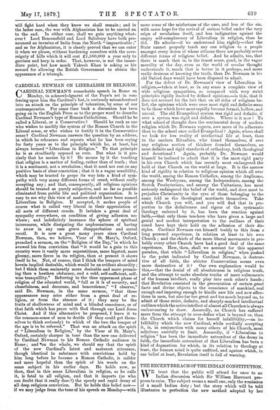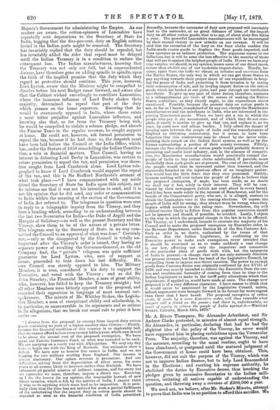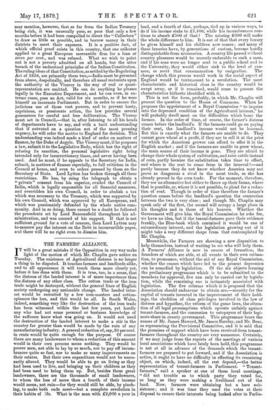THE RECENT BREACH OF THE INDIAN CONSTITUTION.
WE trust that the public will attend for once to an Indian discussion which Sir William Harcourt pro- poses to raise. The subject seems a small one, only the remission of a small Indian duty ; but the story which will be told illustrates to perfection the new method adopted by her repeatedly sent deputations to the Secretary of State for distres.,have therefore gone on adding spindle to spindle, upon the faith of the implied promise that the duty which they repeal the tax, because if he had done so, the despatch must people of India to buy cotton cloths adulterated, if possible, more refuse permission to repeal the tax, and permission was there- shamefully than such goods are at present. The cost of the clothing of fore sought from Lord Cranbrook alone. Lord Lytton tele- the people would thus be increased rather than lessened, and the graphed to know if Lord Cranbrook would support the repeal arguments founded on the injurious effect of an imaginary protec- of the tax, and this is Sir Stafford Northcote's account of tion would lose the little force that they ever possessed. Sixthly, what took place :—" I have communicated with my noble the proposed exemption, if made, has been made, as no doubt friend the Secretary of State for India upon this subject, and we shall say it has, solely in their interest. They will be con- he informs me that it was not his intention to send, and it is vinced by their newspapers (which are read aloud in every bazar) not his opinion that he did send, any order or communication that it has been made solely in the interest of Manchester, and for the to India within the meaning of the section of the Government benefit of the Conservative party, who are, it is alleged, anxious to obtain the Lancashire vote at the coming elections. Of course, the of India Act referred to. The telegrams in question were sent people of India will be wrong ; they always must be wrong, when they in reply to a telegraphic inquiry from the Viceroy, and they impute selfish motives to the ruling race. Nevertheless, the evil bore a heading which, according to an understanding between political results likely to follow from this popular conviction should the last two Secretaries for India—the Duke of Argyll and the not be ignored, and should, if possible, be avoided. Lastly, I object Marquis of Salisbury—as well as the present Secretary and the to the way in which the proposed change in the law is to be effected. Viceroy, show them to be of the nature of a private letter. Council and to make the proposed exemption by Executive order, in The telegram sent by the Secretary of State in no way coin- the Revenue Department, under Section 23 of the Sea Customs Act. mitted the Council to an approval of what was done." Certainly Such an order is, no doubt, authorised by the terms of that not,— only as the disapproval by the Council is totally un- section. But the Indian Legislature, in conferring on the important after the Viceroy's order is issued, they having no Executive power to make such exemptions, never intended that separate power of recalling the Governor-General, as the old in our law, affecting not only the importers and consumers Company had, the " private " telegram was quite sufficient of the particular class of goods dealt with, but the taxpayers guarantee for Lord Lytton, who, sure of support at of India in general,—a change that will not only seriously diminish home, proceeded to beat down his last difficulty. His our present revenue, but force the hand of the Legislative Council, by own Council was sternly opposed to him. The Military goods from Customs duties was originally conferred by Act XVIII. of Member, it is true, considered it his duty to support the 1870, and was merely intended to relieve the Executive from the use- Executive, and voted with the Viceroy ; and so did Sir less and troublesome formality of coming from time to time to the John Strachey, the Financial Member, a man of great ability, straight ; but who, however, has failed to keep the Treasury Legislature, if applied to, would have made at once. The change now proposed is of a very different character. I have reason to think that all other Members were bitterly opposed to the proposal, and it would never be sanctioned by the Legislative Council, unless, recorded their opposition in language of most unusual out- indeed, arguments were brought forward in its favour far more cogent spokenness. The minute of Mr. Whitley Stokes, the Legisla- than those that I have heard. The proposed exemption of cotton five Member, a man of exceptional ability and scholarship, is, in particular, so unanswerable in its arguments and so serious court of equity to relieve the people of India against it.-WHITLEY in its allegations, that we break our usual rule to print it here Srouzs, Calcutta, March 13th, 1879."
entire :— Mr. A. Rivers Thompson, Sir Alexander Arbuthnot, and Sir "I dissent from the proposal to exempt from import duty cotton Andrew Clarke protested, in minutes of almost equal strength, goods containing no yarn of a higher number than thirties :—Firstly, Sir Alexander, in particular, declaring that had he had the because the financial condition of this country is so deplorably bad,
that we cannot afford to lose even twenty lakhs a year, which sum is said
to be about the annual cost of the proposed exemption. We have have supported him in placing restrictions upon the Vernacular spent our Famine Insurance Fund, or what was intended to be such. Press. The majority, therefore, was against the Viceroy, and We are carrying on a costly war with Afghanistan. We may any day the measure, according to the usual routine, ought to have have to begin one with the King of Burmah. Our estimates show a been abandoned, or postponed until the matured judgment of
deficit. We have now to borrow five crores in India, and we are
begging for two millions sterling from England. Our income is the Government at home could have been obtained. This, almost stationary.. Our opium revenue is precarious. And our however, did not suit the purpose of the Viceroy, which was difficulties arising from the depreciation of silver seem, for some not to improve Indian finance, but to help Lord Beaconsfield years at all events, likely to increase rather than diminish. We have in the Elections ; and exerting his supreme authority, he exhausted all gainful sources of indirect taxation, and for every tax
we surrender we must, therefore, impose a direct tax. Knowing,
as I do, the horror (in my opinion, the reasonable horror) of new pledges given by successive Secretaries to the Indian mill- direct taxation, which is felt by the natives of India, I cannot think owners, irritating all natives capable of understanding the it wise to do anything which must lead to its imposition. It is pain- question, and throwing away a revenue of £200,000 a year.
fully clear that the time has not arrived for even a partial fulfilment
of the undertaking that the import duty on cotton goods should be We need not, we believe, after Mr. Stokes's Minute, attempt repealed as soon as the financial condition of India permitted. to prove that India was in no position to afford this sacrifice. We Majesty's Government for administering the Empire. As our Secondly, because the &mender of duty now proposed will inevitably readers are aware, the cotton-spinners of Lancashire have lead to the surrender, at no great distance of time, of the import
duty on all other cotton goods, that is to say, of about sixty-five lakhs a year. The powerful Lancashire manufacturers will be encouraged
India, begging that the five-per-cent. duty on English cottons by their second victory to new attacks on our revenue. It will be levied in the Indian ports might be removed. The Secretary said that the retention. of the duty on the finer cloths enables the has invariably replied that the duty should be repealed, but India-made coarse goods to displace the finer goods imported, and has invariably added the rider that repeal must be delayed thus operates as an indirect protection. The argument seems to me
fallacious, but it will be none the less effective in the mouths of those
until the Indian Treasury is in a condition to endure the that will use it against the helpless people of India. If ever we have any consequent loss. The Indian manufacturers, knowing that true surplus, we should, in my opinion, lessen some of our direct taxes, the Treasury was not only not full, but in unprecedented rather than abolish any of our moderate import-duties. Thirdly, be-
cause, apart from the trifle we obtain as tributes and nazrcinas from the Native States, the only way in which we can get those States to
pay anything towards their proper share of our expenditure in keep- regard as protective should continue. This year, however, ing the peace of India and protecting it from invasion is by taxing Lord Lytton, aware that the Ministry might be compelled to their consumption of salt, and by levying import duties on the cotton dissolve before his nest Budget came forward, and aware also goods which are landed at our ports, and pass through our territories that the Cabinet wished exceedingly to conciliate Lancashire, into theirs. To give up any part of those duties, therefore, amounts
to a relinquishment pro tanto of the means of making the Native
where the immense influence of Lord Derby shakes their States contribute, as they clearly ought, to the expenditure above majority, determined to repeal that part of the duty mentioned. Fotirthly, because the present duty on cotton goods is which presses on the home exporters. Knowing that he not, so far as I know, complained of by any one, except the Manchester would be strenuously opposed in India, where there exists
manufacturers and the merchants in India, who are interested in im-
a most bitter prejudice against Lancashire influence, and porting Manchester goods. When we have got a tax to which the
people who pay it are accustomed, and of which they do not corn.
knowing also that, so far from the Treasury being rich, plain, it surely is unwise to give up that tax, and replace it, as we he would be compelled to violate a solemn pledge, and absorb must, by some new and odious burden. I fully admit the danger of the Famine Taxes in the regular revenue, he sought support keeping open between the people of India and the manufacturers of at home. He could not, however, ask formal permission to England an irritating controversy, but it seems to have been
forgotten that this controversy may be closed by the latter relin-
quishing their attack on the Indian fiscal system, as well as by the have been laid before the Council at the India Office, which former surrendering a portion of their scanty revenues. Fifthly, has, under the Statute of 1858 remodelling the Indian Constitu- because the free admission of cotton goods would probably destroy a tion, a veto in financial matters. That Council, having no Promising and useful local industry, and, in the absence of competi- interest in defeating Lord Derby in Lancashire, was certain to tion, the Manchester manufacturers would practically compel the people of India to buy cotton cloths adulterated, if possible, more refuse permission to repeal the tax, and permission was there- shamefully than such goods are at present. The cost of the clothing of fore sought from Lord Cranbrook alone. Lord Lytton tele- the people would thus be increased rather than lessened, and the graphed to know if Lord Cranbrook would support the repeal arguments founded on the injurious effect of an imaginary protec- of the tax, and this is Sir Stafford Northcote's account of tion would lose the little force that they ever possessed. Sixthly,
because nothing will ever induce the people of India to believe that The Viceroy, as I understand, intends to overrule the majority of his it should be exercised so as to make suddenly a vast change compelling them to impose new direct taxation. The power to exempt Indian Legislature to make in the tariff petty alterations which that goods, if made by a mere Executive order, will thus resemble what lawyers call a fraud on the power ; and there is, unfortunately, no
slightest idea of the policy of the Viceroy, he never would abolished the duties by Executive decree, thus breaking the may mention, however, that so far from the Indian Treasury being rich, it was unusually poor, so poor that only a few months before it had been compelled to direct the " Collectors" to draw as little as possible, and to borrow money in their districts to meet their expenses. It is a positive fact, of which official proof exists in this country, that one collector applied to a great European mercantile firm for a loan at seven per cent., and was refused. What we wish to point out is not a poverty admitted on all hands, but the utter breach of the understood principles of the Indian Constitution. The ruling ideas of that Constitution, as settled by the Regulating Act of 1858, are primarily these two,—India must be governed from above, despotically, and therefore all usual restraints upon the authority of the Viceroy in the way of real or quasi- representation are omitted. He can do anything he pleases legally in the Executive Department, and he can even, in ex- treme cases, pass an Act, valid for six months, as if he were himself an incarnate Parliament. But in order to ensure the judicious use of these vast powers, and to prevent hasty, capricious, or passionate action, the law provides several guarantees for careful and free deliberation. The Viceroy must act in Council,—that is, after listening to all his heads of departments have to say, and with a tacit understanding that if outvoted on a question not of the most pressing urgency, he will refer the matter to England for decision. This understanding was indeed made a kind of order on matters of finance, by the Duke of Argyle. The Viceroy must, if he proposes a law, submit it to the Legislative Body, which has the right of refusing its sanction, the personal legislative right being intended only for insurrectionary times, and never, having been used. And he must, if he appeals to the Secretary for India, submit, in matters of finance especially, to full criticism in the Council at home, and even to orders pressed by them on the Secretary of State. Lord Lytton has broken through all these restrictions. He has, by using the telegraph to obtain a " private " consent from his superior, evaded the Council of India, which is legally responsible for all financial measures, and overridden his own Council, in order to abolish a tax which was necessary to the Treasury, which was supported by his own Council, which was approved by all Europeans, and which was passionately defended by the whole native com- munity. And in so doing, there cannot be a doubt he followed the precedents set by Lord Beaconsfield throughout his ad- ministration, and was assured of his support. If that is not sufficient ground for a vote of censure, then Lord Lytton may to-morrow pay the interest on the Debt in inconvertible paper, and there will be no right even to dismiss him.




































 Previous page
Previous page